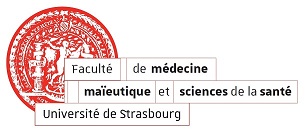Course details
In collaboration with
 |
 |
MASTER: Program details

20 Students Accepted Annually
| Who should apply? | Surgeons, gastroenterologists |
| Requirements: | Only open as continuing training (no resident) |
| Logistics: |
2-year program |
| Location: |
IHU in Strasbourg France |
| Application Deadline: |
October 1st, 2020 |
| Course Start: |
Fall 2020 |
Program syllabus
OBJECTIVES
Basic and advanced flexible endoscopic techniques will be presented by experienced surgeon and endoscopists, with didactic endoscopic images, video clips of clinical cases and then practiced during hands-on sessions. You will learn key endoscopic procedures in a structured way, under the mentorship of world-renowned experts in the field with access to the newest technologies and techniques:
M1

To learn the endoscopic management of common surgical complications: bleeding, perforations, leaks and fistulas, stenosis...

To acquire basic endoscopic skills required to form a foundation in the practice of flexible endoscopy.

To address the indications, techniques and results of the most common procedures in flexible endoscopy.
M2
(according to the selected path)

To learn Endoscopic ablation and resection techniques: RFA, EMR and ESD

To learn ERCP and EUS

To learn Submucosal tunneling techniques: POEM, POP, STER ...

To learn Endoscopic sleeve gastroplasty and suturing techniques.
 |
At the end of the program
|
Courses
-
Basic Principles
Learn moreWith Module One, “Basic Principles”, we introduce you to the fundamental tools, techniques and principles underlying surgical endoscopy. The lectures within this module are divided into sections covering Surgical, Medical and Common considerations. This is done to emphasize that students with various backgrounds will take part in this training and allows us to start with a shared understanding of the fundamental principles, tools and practices involved. We begin with the endoscope (its variations, components and accessories) and start to explain the techniques and tricks for technical success... -
Principes de base
Learn moreÀ travers ce premier module intitulé « Principes de base », nous vous présentons les outils, les techniques et les principes fondamentaux sous-jacents à l’endoscopie chirurgicale. Les conférences qui composent ce module sont divisées en sections mettant en évidence des considérations à la fois chirurgicales, médicales et communes aux deux disciplines. Nous faisons cela afin d’insister sur le fait que des étudiants issus de divers horizons prendront part à cette formation, nous permettant ainsi de commencer à partager nos connaissances des principes, outils et pratiques fondamentaux dont il est question. Nous commencerons par parler de l’endoscope (ses variantes, ses composants et ses accessoires) puis nous vous donnerons quelques trucs et astuces pour réussir sur le plan technique... -
Basic Principles
Learn moreWith Module One, “Basic Principles”, we introduce you to the fundamental tools, techniques and principles underlying surgical endoscopy. The lectures within this module are divided into sections covering Surgical, Medical and Common considerations. This is done to emphasize that students with various backgrounds will take part in this training and allows us to start with a shared understanding of the fundamental principles, tools and practices involved. We begin with the endoscope (its variations, components and accessories) and start to explain the techniques and tricks for technical success... -
Digestive
Learn moreIn Module Two, we approach the “Digestive System” in 4 parts: the esophagus, stomach, small bowel, and colon. An additional chapter will focus on bariatrics. For each, we discuss the unique anatomy, pathology, surgical and endoscopic knowledge and the complications involved. We will cover diagnostic EGD, surveillance and treatment of Barrett’s esophagus (including advanced imaging techniques) and therapeutic basics such as biopsy, tissue resection and ablation – for esophagus and stomach as well. From there we address enteral access and the unique diagnostic and therapeutic issues in the colon and rectum... -
Digestif
Learn moreIn Module Two, we approach the “Digestive System” in 4 parts: the esophagus, stomach, small bowel, and colon. An additional chapter will focus on bariatrics. For each, we discuss the unique anatomy, pathology, surgical and endoscopic knowledge and the complications involved. We will cover diagnostic EGD, surveillance and treatment of Barrett’s esophagus (including advanced imaging techniques) and therapeutic basics such as biopsy, tissue resection and ablation – for esophagus and stomach as well. From there we address enteral access and the unique diagnostic and therapeutic issues in the colon and rectum... -
Hepato-Biliary-Pancreatic
Learn moreModule Three is a continuation of our organ system - focused approach to flexible surgical endoscopy. In this module, “Hepatobiliary-Pancreatic” (HBP), we cover the pertinent anatomy, physiology, disease processes and interventions pertaining to the medical and surgical management of this complex system... -
Hépato-Bilio-Pancréatique
Learn moreLe Module 3 continue notre approche de l’endoscopie chirurgicale flexible axée sur les organes. Dans ce module hépato-bilio-pancréatique (HBP), nous couvrons l’anatomie, la physiologie, les pathologies et les interventions pertinentes relatives à la prise en charge médicale et chirurgicale de ce système complexe. -
-
-
Bariatric Endoscopy
Learn moreThis module will provide a comprehensive review of clinically available primary endoluminal endoscopic weight loss procedures, weight regain endoscopic management options and management of bariatric surgical adverse outcomes
